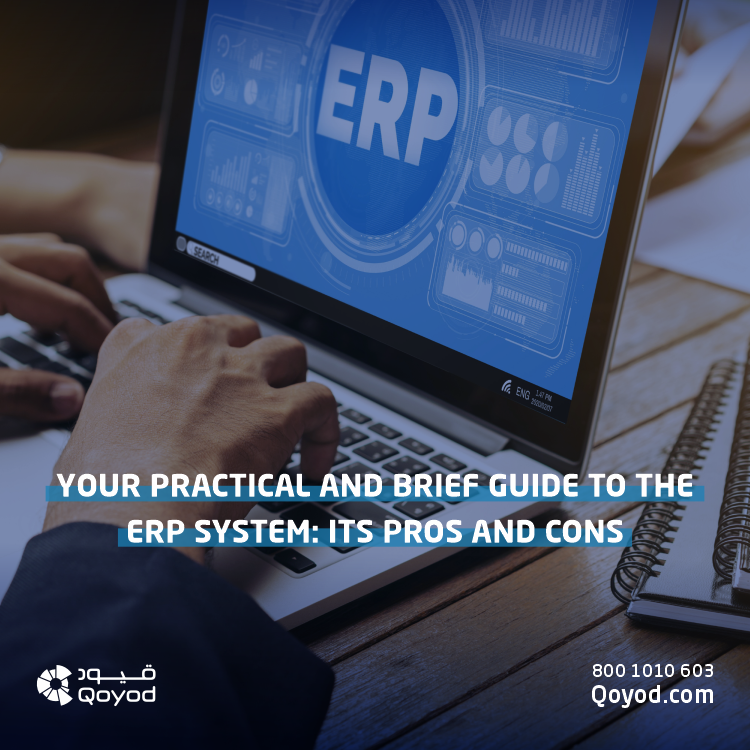As you know, the business world doesn’t void of surprises and strange terms.
This may be the first time you have heard of the term ERP system or you may have heard of it before.
The logical question now is : what is this system? And what is its benefit?
Is it suitable to use in a small or medium enterprise?
This is what we will discuss in more detail in this article, we will give you objective information to decide for yourself in the end.
As you know, the business world doesn’t void of surprises and strange terms.
This may be the first time you have heard of the term ERP system or you may have heard of it before, in general:
It is an abbreviation for Enterprise Resource Planning.
There is a difference between enterprise and establishment, the first is large and the second is small.
The logical question now is: what is this system? And what is its benefit? Is it suitable to use in a small or medium establishment?
This is what we will discuss in more detail in this article, and we will give you objective information to decide for yourself in the end.
What is ERP system?
As mentioned in the introduction of the article, the word ERP is an abbreviation for the phrase: Enterprise Resource Planning or what is known as ERP system.
It is a system that has evolved from paper and pen to a computer program that helps enterprises and establishments in managing various work processes.
Such as: managing accounting, procurement, marketing, projects, supply chains, and many other daily tasks that any entity needs to facilitate its work.
It is not a new system. Let’s take a look at its history.
An overview of ERP history:
The first ERP system dates back more than 100 years and was called: EOQ, which is an abbreviation for the phrase: Economic Order Quantity.
The system was developed by Ford W. Harris, who represented a huge breakthrough in that period.
This is because most of the stressful jobs that enterprises have been suffering from are: inventory management, demand and supply.
But with the massive development of the business, the need for another more flexible solution emerged.
this was the generator of the MRP system in 1964 and it was a system which worked by the computer, and the best solution remained for a long period of time.
Until another version of it was programmed, called: MRP 2; but with the tremendous development of technology in the eighties and nineties of the last century, this system evolved to reach the ERP system.
This is a brief history of the evolution of the ERP system, now let’s see how this system works.
How does the ERP system work?
It should be noted that the industrial field was one of the first fields which adopted this system.
It can even be said that the industrial field contributed significantly to the development of this system, and gained wide fame after that.
Its use extends to other areas: health, public services, government agencies, and many others.
Each sector has its own needs that it wants to satisfy by adopting the ERP system.
but the way it works can be summarized in facilitating the following tasks:
- Customer Relationship Management
- Human Resource Management
- Project Management
- Marketing Operations Management
- Financial Management and Accounting
- Inventory Management
- Risk Management
- Providing an integration system to manage e-stores
- Data storage
The most prominent types of ERP systems
We agree that every business entity has special and specific requirements, for example, a huge entity like Amazon KSA will need an ERP system to accurately manage inventory operations; to avoid any disasters, it will result in heavy financial losses.
Whilst a contracting company exclusively wants a system that helps it estimate and manage costs.
Hence the ERP systems appeared which focus on meeting the desired need with the respect for the fields and their specializations.
Among the most prominent systems are the following:
- A special system for manufacturing system
- A special system for wholesalers and suppliers
- A special system for retailers
- A special system for contracting and construction
- A special system for professional services
- A special system for non-profit organizations
- A special system for accounting
There is also another way to choose ERP system, It is through the way it works.
such as choosing an internal system that works exclusively within the company or an easy cloud system that can be accessed at any time.
But this is all due to some organizational factors.
such as: the size of the establishment, the number of employees, geographical distribution, and the internal resources available.
That is why I strongly advise you to review the pros and cons of this system shortly to make the appropriate decision.
Pros of using ERP system for Small and medium enterprises:
Small and medium enterprises that use ERP system as an essential tool to manage their various tasks and internal resources will have a set of advantages, they are:
Integration and compatibility: The system helps you consolidate all your internal resources that you need to manage your enterprise in one place.
which eliminates many work disruptions and misunderstandings between different departments of your business. This has a big role in increasing the efficiency of your teams.
Fully consistency: Since you have all the tools and applications your team needs to manage the various tasks of your enterprise, the review and audit process will be very easy.
because all processes are integrated into one main system.
Clear Vision : One of the really great benefits of this system lies in your ability to generate various reports for everything you need to know about your business.
You easily get your hands on weaknesses and strengths, and also: production problems if any.
Which helps you make effective leadership decisions that drive your business towards leadership and profitability.
High flexibility: Since your business may grow and evolve over time, the ERP system is very flexible and you can develop it to match your new requirements left by the growth of your organization.
Literally, the advantages that you will see from activating the ERP system and linking it to the tools and applications you use, You will see amazing results, it is a very smooth and practical system.
Cons of using ERP system for small and medium enterprises:
The rule of life says: nothing is perfect, The same rule applies to the ERP system.
As it is an effective practical system, but it also has a number of cons, the most prominent of which are:
Slow linking process: Since ERP system touches all the different aspects of your business (and that’s its role), the process of connecting it with your applications and tools will take a great deal of time.
Be well prepared for the loss of a huge effort on both the practical and financial sides.
High cost: You should realize that it is a very expensive system, not only in terms of financial, but in terms of the productivity of your teams.
In addition to the high cost of purchasing the system, you will pay for it in training your teams to use it and integrate it into their daily tasks.
Slow data transfer: It’s normal to use a variety of technical tools with special software to manage some of the essential tasks in your activity.
But what hurts is when it’s time to transfer this data to the ERP system to integrate it in one place,
You will need to be very patient because it takes a lot of time.
Difficulty of customizing the system: We can’t deny that it is a flexible system and can be customized to suit your specific needs.
But the application of the previous process is difficult and costly in terms of time and effort, this is in terms of system customization but in terms of updating it as a system for saving important data and information.
You will need to communicate with the company you bought it from, because they are the only ones who can take over that task.
You’ll also need to report any problems or malfunctions to them, which will result in losses in productivity and efficiency of the work as a whole.
We conclude from the above that ERP system is a more effective system for large enterprises due to the advantages it offers, unlike small and medium enterprises.
It’s an ineffective solution, because you often need a flexible and fast system for these enterprises that smoothly delivers what you want.
You often don’t have the same large requirements as large enterprises. Hence the following logical question.
How to choose your right system wisely?
To agree that as a micro or medium-sized enterprise, your main requirements are limited and specific.
we can summarize them as follows:
- Financial and accounting operations management
- Full inventory management
- Time management
- Electronic connectivity with various applications or technical tools that may be needed in one system.
Perhaps the best option for you is to invest in one software system at an affordable cost monthly or annually and provides all of the above to increase productivity and raise the efficiency of your teamwork.
Perhaps the best option for you is: Qoyod. Quite simply.
Qoyod is a cloud accounting system that does not need to be downloaded.
You can try it for free from here for 14 days to decide with confidence.
whether it is right for you or not, try it now.
The conclusion:
Now you have a thorough understanding of the ERP system, which is really great,
But truth be told, Qoyod is best for small and medium enterprises because it provides solutions compatible with the most important requirements that these activities are looking for.
It also mixes advanced accounting and business solutions to give you a unique and effective solution.
The ideal solution is one that does not require much effort to customize and refine to match your requirements, not even time to train your team to know about it and know how to use it.
It’s an easy solution that can be used immediately and satisfies your main business needs.
Managing accounting, payroll and inventory and the feature of linking with tools and applications that you may need to manage your business from one place.




